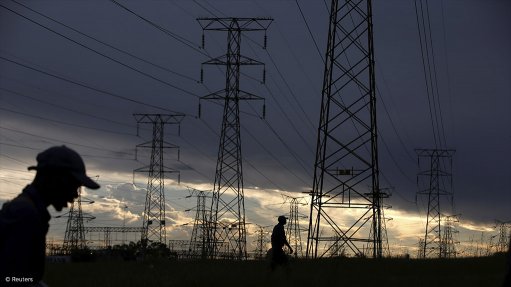
Photo by: Reuters
The Minerals Council South Africa opposes the latest tariff increase application by electricity supplier Eskom, which is starting to control its operational and managerial costs, but is caught between the reciprocal consequences of a lack of generation capacity and the need for damaging and unaffordable tariff increases.
The uncertainty of electricity supply, the future tariff path, and the institutional setup determining such, are hugely detrimental to investment and economic growth.
The requested tariff increases of 26%, 20% and 9% for the financial years of 2022/23 to 2024/25 are simply unsustainable not only for the mining industry but the country where four out of ten adults are unemployed and economic growth has stalled. The increases represent R279 billion, R335 billion and R365 billion per year in the three-year period.
The Minerals Council warns that the tariff increase could be as high as 54% depending on the phasing of the court judgment instructing the National Energy Regulator of South Africa (Nersa) to liquidate outstanding regulatory clearing accounts, and disallowing fiscal augmentation from the government, which is the sole shareholder of Eskom.
The Minerals Council estimates the total arising from the liquidation order to be in excess of R74 billion, comprising the RCA of more than R28 billion and the government capital injection of R46 billion.
In its submission on Friday, 21 January, to Nersa at public hearings into the tariff application, the Minerals Council warned of dire consequences if Nersa allowed the increases.
“These increases, if allowed, will be catastrophic for the economy in general and the mining industry in particular, with damage coming from the impacts of electricity cost escalation well above inflation as well as the consequences of constrained energy supply from Eskom,” says Minerals Council Chief Economist Henk Langenhoven.
Implementing Eskom’s request could severely affect the energy intensive sectors, which account for 41% of the country’s GDP, 44% of employment and 70% of all merchandise exports, he says.
The mining industry adds 8.4% or R500 billion to GDP. Total mineral sales amount to R826 billion. Mining, processing, smelting, and refining of minerals consumes about a third of Eskom’s electricity. The industry employs more than 450,000 people, which is 4.7% of private non-agricultural employment.
The South African Reserve Bank has shown in studies that it has lowered potential GDP growth forecasts to 0.8% over the next two years, which is disastrous for millions of unemployed South Africans and school leavers, and that government-administered costs like electricity, transport logistics operated by Transnet on the country’s railways and harbours, and fuel were the primary cost-push drivers of inflation.
“The Eskom proposals will fundamentally restructure input costs for the mining industry, increasing them from 11% to 16% on average of intermediate inputs,” says Langenhoven.
The Minerals Council welcomed a long-overdue review of the Multi-Year Price Determination methodology. “A stable, affordable and predictable price path of electricity is important for the viability and growth of the mining sector and broader economy,” he says.
Minerals Council member companies have a pipeline of 3,900MW (3.9GW) of potential renewable energy projects worth more than R60 billion that would, when implemented, substantially contribute to bridging the large country electricity supply deficit, diversify the country’s supply, reduce the sector’s carbon footprint, and stabilise mining costs.
The Minerals Council’s submission may be accessed at https://www.mineralscouncil.org.za/downloads/send/19-latest/1841-mypd5-nersa-public-hearings
Issued by Minerals Council